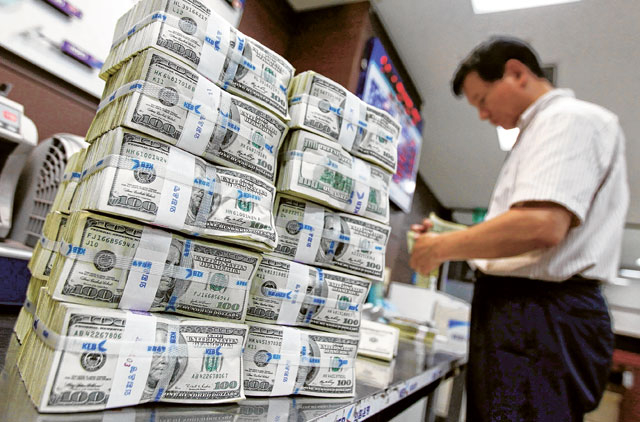
Dubai: The downgrade of the US credit rating from AAA to AA+ has caused a lot of concern among the UAE business community. The impact was felt across the region's stock markets.
According to Frost & Sullivan, as the currencies of the Gulf Cooperation Council (GCC) countries are pegged to the US dollar, they are expected to depreciate in the short term along with the dollar.
Since oil is the biggest revenue generator for the Middle East, the short-term decline in oil prices might lead to fiscal pressures.
Mitigate pressures
"However, the opportunity cost of providing subsidised fuel to the power intensive companies in the Middle East is expected to decline. This might partially mitigate the fiscal pressures. The cost of refinancing might increase in the short term, especially if Moody's and Fitch downgrade their rating of the US economy.
"This might also prompt the institutional investors in the Middle East to diversify their holdings in the medium term to reduce dollar denominated exposure," Shrikanth S, Industry Analyst, Business and Financial Services Practice, Frost & Sullivan, says.
"In the short term, the stock prices may depress. This may further provide excellent buying opportunity for the long term value investor and may moderate the stock prices decline. If the crude oil prices decline below $80 a barrel (Dh293), the Organisation of Petroleum Exporting Countries (Opec) might consider cutting production to arrest the downward trend in the prices."
Gulf News has sought the opinions of a number of corporate leaders on the possible impact of the latest downgrade. The questions that we have asked are:
Do you think we will see a double-dip recession globally after the recent economic news in the US? What will this mean for the region?
Badr Jafar, President of Crescent Petroleum:
"It is important to realise that the US dollar will remain the global reserve currency for the foreseeable future, simply because there is no strong alternative, especially with the Eurozone debt problems impacting the euro."
"For this reason, and because political considerations outweigh any potential economic costs, the US dollar peg with GCC currencies will remain for the foreseeable future."
"The situation is still fluid, however the biggest concern to me is the psychological impact that the first time ever downgrade of the world's sovereign currency will have on global investor confidence levels. And as confidence levels take a big hit and people take fewer risks, then the snowball effect continues and the negative economic outlook will continue, including in our region's capital markets."
"Since regional markets are intrinsically linked to the markets on both sides of the Atlantic, I would expect that if the above situation materialised, that we would expect to see a resulting further slowdown in the real estate and construction markets, slowdown in exports of petrochemicals and related products, a more sluggish recovery of the banking sector, an oil price correction to lower levels, and importantly a lower foreign appetite for local government and consumer credit."
Rajeev Kakar, CEO of Dunia Finance:
"I don't think we will hit a double-dip recession. Governments are far more matured in there responses and there is greater coordination."
"I think we are heading for a long period of slow growth. The west will be slow — will go through a readjustment period that could last as long as ten years. The West is going through a period of debt deflation and deleveraging. The emerging market is going to take a long time to offer alternatives."
The situation requires adequate and sound monetary policy, it requires a responsible/reaction behaviour. It's about confidence. Good governance is a good deterrant to all these.
As for the UAE, the country has digested its problems, much of the old problem is being dealt with. I do not see a major impact on our economy.
Rizwan Sajan, chairman of Danube Building Materials:
"The risk of a double-dip recession is rising. The recent announcement that ratings agency Standard and Poor's (S&P) downgraded US' long-term debt to AA+ has caused a rout in world markets and further bolstered widespread belief that another recession is imminent."
"With the US economy already so fragile, the shock of another stock market drop and resulting loss of wealth could be the tipping point to bring on the recession. Of great concern is that a new recession would be worse than the last and very difficult to pull out of. Investors are worried that the American economy has lost what little momentum it already had."
"US gross domestic product, the broadest measure of economic growth, grew only 0.4 per cent in the first quarter, and 1.3 per cent in the second, and we feel fear that at a rate that slow, it wouldn't take much for growth to turn negative.
"Inflationary pressures will mount as dollar weakens since imports will be costlier. Since oil and gas revenues are in dollars, continuing weakness of the dollar could have an adverse impact on oil prices."
"Imports of consumer items and capital goods could see an increase over time. Exports could get affected as the dollar loses value and hence will not be competitive."
Mohammad Johmani, CEO and founder of Auto Network:
"I don't think anyone now is in a position to predict or be sure of what is happening. In 2008 many people were predicting and it turned out that the entire economic system proved to be not the right one."
"In a recent announcement from the White House, a spokesman said that the economy is in no threat of falling into a double-dip recession because there was growth, although it was slow, in the past eight months.
"I don't know if he was saying this to cool down anger worldwide about the US debt but it's still an announcement from the White house.
"The difference between the US or Europe and the Middle East is that governments there are more transparent. It is easier to do business when you have information and can plan accordingly. In the Middle East it's not as transparent. If the US was in a recession they would say it.
"If a double-dip recession does develop it will not be as bad as in 2008. It taught everyone a lesson, governments are more prepared for a recession than before. It won't be as difficult as 2008. In the US, there is still growth in the technology sector, it can be leveraged in the next stage.
"What will this mean for the region? Definitely there will be a ripple effect. I don't agree with what they said in Dubai that it won't affect us. It will. The question is how badly will it affect us and how much are we exposed now to that debt.
"The Gulf is after China and Japan in exposure to US debt so we can't say there's no effect.
"The business community will not be affected that much because we took so many decisions and reacted to the 2008 recession so we're in a better position to face a double-dip recession. 2008 came after mad growth in the market, the recession came and no one knew how to deal with it and governments took time to announce it, there was no experience to deal with the situation. But now we know how to deal with it… we're in a better position than 2008.
"If [the] GCC is to become a leading economy, it has to create its own currency and peg oil prices to that currency. If the Gulf monetary union creates a new currency in 2015 and oil prices are linked to it, the Gulf will achieve a growth rate. If it remains linked to the dollar it will be affected badly."
Naser Kandah, Chief operations officer of Unger Steel Middle East:
"This is very bad news in the US and Europe and people are tied to the euro and dollar. But whatever happens, the global economy will keep running.
"I'm not expecting a double-dip recession. The world is pegged to the dollar and the euro and will back it up. But life is full of surprises."
"After what happened a few years ago, one doesn't know heads from tails anymore. Before that, we used to have an agreement for a full year but now things are different. There are no guarantees for the future. The future is hard to predict.
"I don't think [it will be as bad as 2008], countries are better prepared this time. Even as a small company, we are prepared for any calamities.
"In the GCC, people are tied to Gulf oil, they are sitting on black gold. The oil revenues and population ratio here cannot be compared to the huge populations of Russia, China or Europe."
Deepak Babani, Chief executive officer of Eros Group:
"It is quite possible [that we will see a double-dip recession].
"The US is probably going to get into another recession.
"In Europe it was only Greece and Portugal that were in trouble, but now also Italy is getting into trouble. The situation is not very good. A fallout of this will surely happen for the entire world — more so in the Middle East because we're a dollar-based economy.
"I expect two [outcomes]. Far East currencies will get stronger as they de-invest from the dollar to other currencies and they are backing up their own currencies. Most products into this region come from the Far East. With the currency impact costs will also go up.
"Most of the UAE tourism is from Europe and the US, they will be spending less money, and there's going to be some amount of decline to tourism. Globally we'll have an equally bad impact as in 2008.
"The year 2008 was a very good learning curve and people are much better prepared than 2008, taking proper precautions now than then: more conservative on expansion, reducing investments, and looking at every investment with a more cautious eye."
Christoph Meier, Head of corporate communications, Southeast Europe, Africa, Middle East and Pakistan, for Lufthansa:
"There is obviously a widespread fear that a worldwide stock market plunge could be an early indicator of a double-dip. However, even leading economists will disagree in their predictions.
"If there were in fact a double-dip, it would certainly impact the global economic performance. Again, which region will be hit how strongly, is difficult to predict. I guess we will leave this to economists."
Amer Al Kurdi, Group chief investment officer, Al Rostamani Group:
"This [double-dip recession] is the most likely scenario. What we have seen in the past three years, since the [global] financial meltdown in 2008, is that governments such as the USA have rushed to save their banking systems by taking over the problems themselves. However, they have not really solved the problems.
"They embarked on loose fiscal and monetary policies to ensure that the banking system will survive through the capital injection and economic growth policies adopted.
"This gave a boost to the economies for a short period, but it did not actually address and solve a lot of the issues of the banking sector that were behind the meltdown in 2008, nor did it propel consumption to better levels."
"In general, and aside from the fiscal effects of the dollar volatility and the peg of almost all GCC currencies to it, the region may be affected by the expected drop in oil prices as demand falters in light of the forecast recession. This will put pressure on GCC government budgets and spending.
"There are definitely a number of similarities in terms of market reactions, such as collapsing banks in the US, continued drop in house prices, unemployment growth, global contagion, but there are also some differences such as low inflation.
"Usually history does repeat itself, and in the 1930s the US indices dropped during the second wave of selling to the lows seen in the first earlier correction.
"Hence, there is still a possibility that the Dow Jones will fall to the 7,000 to 8,000 level."













